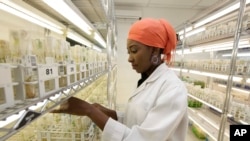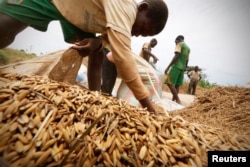The organizers of this week's Africa Green Revolution Forum in Kenya say the continent is well on its way to an agricultural renaissance.
The forum is wrapping up with a significant boost toward that goal: a pledge of $30 billion during the next 10 years to support smallholder farmers and local African agribusinesses. The donors include African governments, businesses and development partners, many of whom have been present for the Nairobi forum.
But significant challenges remain for the continent, and experts have many theories about what it will take to make Africa’s green revolution a reality.
Country manager James Craske of Yara, a leading fertilizer manufacturing company in Africa, said quality seeds and fertilizer would make a difference.
“I think we really need to look at the farm management for smallholders," Craske said. These smaller operators need better-quality inputs and expertise in using them to achieve optimum yield and quality, "so that they can move ... from subsistence to commercial farming and become more and more profitable."
Many African countries are seeking to become food self-sufficient. It is a goal that has gained even more urgency in the past year. Low global commodity prices have hurt African economies and currencies, raising the prices of imports at markets, and El Nino-induced drought left 30 million people food-insecure in southern Africa. Fifty years ago, Africa was exporting agricultural products to the world.
A new report from the Alliance for a Green Revolution in Africa (AGRA), which is hosting the forum, said the continent spends $35 billion importing food each year and loses $4 billion to food waste.
Wider vision of growth
Mamadou Biteye, the Rockefeller Foundation's managing director for Africa, sees a comprehensive approach to growth as vital.
“The continent produces sufficiently to feed itself," Biteye said. "The problem we have is about 30 to 40 percent is lost due to inefficiencies — that is where the challenge of feeding ourselves comes in. So it is really important that we look agriculture in total — pre- and post-harvest management, value addition — transforming our agricultural produce to meet the changing consumption needs of our populations.”
Addressing the forum, Kenyan President Uhuru Kenyatta said agriculture is also about more than just food.
“We are aware growth in agriculture is up to 11 times more effective at reducing poverty than growth in any other sector, and we also recognize until this sector is transformed, our hopes of industrialization as a continent and for us to have a flourishing manufacturing sector will be a little more than a pipe dream," he said.
AGRA says African governments would need to invest at least an additional $13 billion annually to truly revolutionize agriculture on the continent. The goal would be to move from the small-scale subsistence-style farming, which at the moment employs the majority of Africa's workforce, to mechanical and profit-based agriculture.

